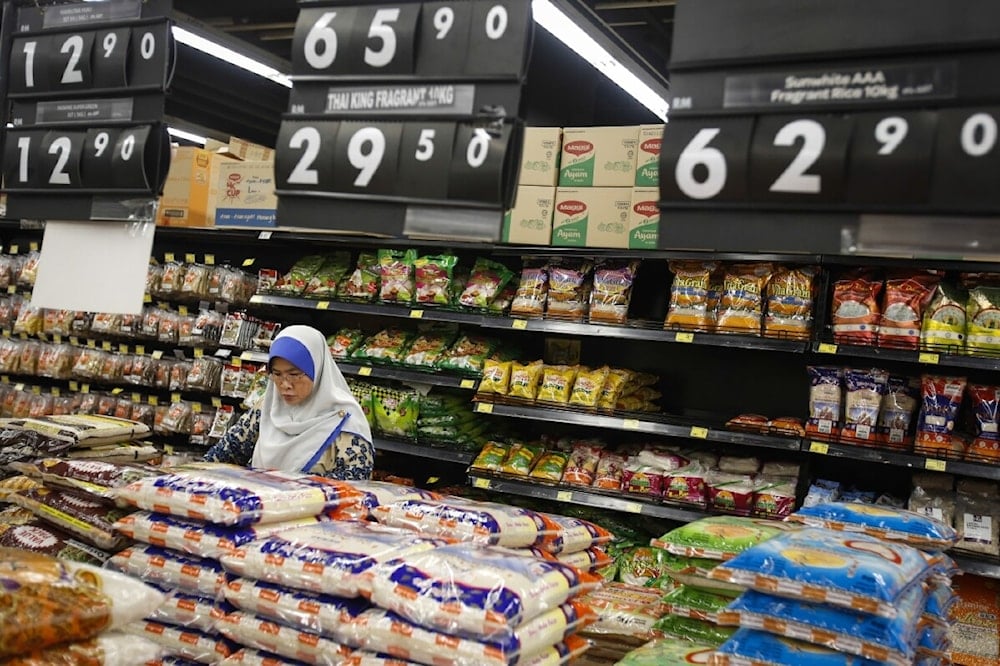Malaysia warns India-Pakistan conflict may disrupt rice supply
Malaysia cautions that India-Pakistan tensions over Kashmir may impact rice imports, prompting efforts to diversify food supply sources across Asia.
-

A Malaysian Muslim woman checks on rice grain in a mall outside Kuala Lumpur, Malaysia on August 18, 2015 (Joshua Paul/AP)
Malaysia has warned that rising tensions between India and Pakistan could directly impact its rice imports, raising concerns over food security as the country depends heavily on both nations for essential grain supplies.
The warning comes as military clashes between the two nuclear-armed neighbors intensified following a deadly attack on tourists in Indian-occupied Kashmir last month. India responded with missile strikes across the border, prompting artillery exchanges and reported casualties on both sides.
Malaysian Agriculture and Food Security Minister Mohamad Sabu said that political and economic instability in the region poses a serious threat to Malaysia’s food supply chain, particularly rice.
“Nearly 40 percent of our imported rice comes from India and Pakistan,” Mohamad told the New Straits Times. “Their political and economic stability is crucial for food security in Malaysia.”
“If a war or tensions occur that affect port operations or delivery infrastructure, rice imports to our country could be disrupted,” he added.
In 2023, India, as the world's largest rice exporter, prohibited non-basmati white rice imports into its country in an effort to keep local rice prices stable. India exports rice to about 100 nations, the most important of which are Benin, China, Senegal, Cote d'Ivoire, and Togo.
Malaysia fears rice shortage amid Kashmir-linked export disruption
India is Malaysia’s primary supplier of white rice, while basmati rice is predominantly imported from Pakistan. Both varieties are staples for Malaysia’s population of 34 million. Although current supplies remain stable, the government is closely monitoring the situation.
“If the situation in that region escalates, it will certainly have a direct impact on us, particularly in terms of prices and supply continuity,” the minister warned.
Last week, authorities in Pakistan-administered Kashmir urged residents near the Line of Control to stock up on two months’ worth of essentials amid the rising tensions. Prime Minister Chaudhry Anwar ul Haq announced a 1 billion rupee emergency fund to support food, medicine, and road maintenance for affected areas.
To mitigate potential supply disruptions, Malaysian authorities are strengthening ties with other rice-producing nations in the region, including Vietnam, Thailand, and Cambodia.
The Ministry of Agriculture has stated that these measures are preemptive, aimed at ensuring long-term stability in the face of growing geopolitical risks.
The recent India-Pakistan conflict escalation
The regional tensions follow a deadly April 22 attack in Indian-administered Kashmir, in which 26 civilians were killed. New Delhi has accused Islamabad of supporting the attack, an allegation Pakistan firmly denies.
On Wednesday, Pakistan launched a significant retaliatory operation targeting Indian military positions in India-occupied Kashmir, downing five (updated from three previously reported) fighter jets and destroying a brigade headquarters, according to Al Mayadeen’s correspondent and security sources cited by the Associated Press of Pakistan (APP).
Malaysia’s reliance on India and Pakistan for rice imports places it in a vulnerable position amid the ongoing instability. While domestic supplies are currently sufficient, officials warn that any disruption at the source could trigger price hikes and shortages in the near future.

 3 Min Read
3 Min Read








